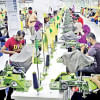When death is built into the system

Dhaka may have developed at an unprecedented rate, with high-rise buildings and ambitious development projects at almost every corner of the city, but the lives of those tasked with building them – the construction workers – remain as precarious as ever. On August 2, two workers died while painting a building's exterior in Active Pharmaceutical Ingredients Industrial Park in Munshiganj's Gazaria upazila. According to our report, 27-year-old Md Shahid and 25-year-old Abdus Sobhan fell from a height of about 50 feet as the rope on which they were hanging snapped. Can we really say we are shocked by their deaths, given that they were suspended in air without any protective gear or harness? In most cases, workers don't even have the ropes tied around them – they simply perch on the structure made of ropes while doing strenuous work for hours on end, without anyone seemingly worried about what would happen should they lose their balance.
For years, if not decades, we have talked about the occupational safety of workers (or the lack thereof) in the informal and construction sectors, but there have been no concerted efforts to mitigate the tremendous risks under which they work. In Bangladesh, construction site compliance is still regarded as a voluntary set of instructions by most developers and owners, rather than a binding agreement for which one will be held to account. Whenever the issue of compliance comes up, the response from the government's end is that it is difficult to monitor the informal sector. But for how long will we hide behind that excuse? What is holding us back from formalising the construction sector and ensuring a standard set of safety protocols, including provision of personal protection equipment (PPE) and regular and repeated safety trainings?
At least 389 workers have died in 287 workplace-related accidents in the first six months of this year alone, according to a report by Safety and Rights Society (SRS). At least 86 of the victims were from the construction sector. Every year, hundreds of construction workers die or are severely injured, but no one – those supplying the labour, those employing the labour, and those tasked with ensuring the safety of the labour – is ever held responsible. Without any recourse for justice or compensation, the helpless families of the workers are usually silenced by a small token amount. It thus remains more profitable for the concerned enterprises to carry on with their highly problematic workplace practices than to invest in safety gear and protocol.
It would be naive of us to expect owners and employers to change unless criminal action is taken against them, fair compensation packages are made mandatory, and their licenses are revoked or suspended. We urge the government to stop being a silent spectator in this deadly game.


 For all latest news, follow The Daily Star's Google News channel.
For all latest news, follow The Daily Star's Google News channel. 









Comments